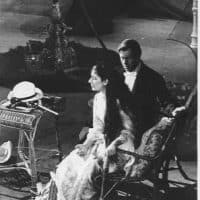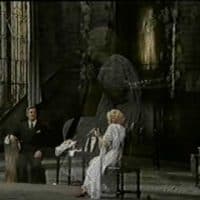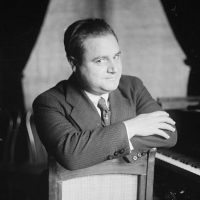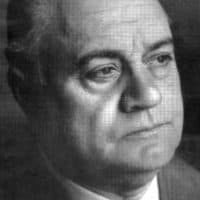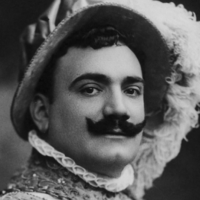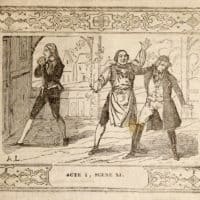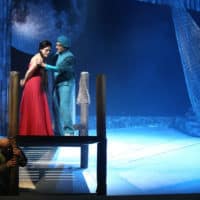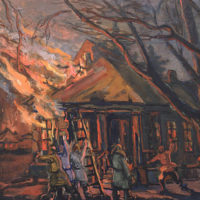 The American tenor Mario Lanza possessed, in the opinion of Richard Tucker, “the voice of the [twentieth] century.” To successive generations of opera stars, from Carreras to Calleja, he was the singer who inspired their careers. And yet Lanza performed only two operatic roles in his short life. This biographical essay offers an overview of an extraordinarily talented but tragic figure.
The American tenor Mario Lanza possessed, in the opinion of Richard Tucker, “the voice of the [twentieth] century.” To successive generations of opera stars, from Carreras to Calleja, he was the singer who inspired their careers. And yet Lanza performed only two operatic roles in his short life. This biographical essay offers an overview of an extraordinarily talented but tragic figure.
Mario Lanza was born Alfred Cocozza in South Philadelphia in 1921. Besotted with opera from a very early age, he was sixteen when his own vocal endowment became apparent, and he was soon appearing in local operatic productions. In 1940 he began studying repertoire with soprano Irene Williams. Two years later, he came to the attention of the celebrated conductor Serge Koussevitzky, who promptly invited him to the Berkshire Music Festival in Tanglewood on a full scholarship. It was here, at Koussevitzky’s urging, that Alfred Cocozza became Mario Lanza—the masculine form of his mother’s name (Maria Lanza).
After just six weeks of intensive study with conductors Boris Goldovsky and Leonard Bernstein, Lanza sang the principal tenor role of Fenton in Metropolitan Opera director Herbert Graf’s production of Otto Nicolai’s The Merry Wives of Windsor on 7 and 13 August 1942. Writing in the New York Times, critic Noel Straus hailed Lanza as “an extremely talented, if as yet not completely routined student, whose superb natural voice has few equals among tenors of the day in quality, warmth, and power.”
Following two years in the US Army’s Special Services, Lanza was signed to an exclusive contract with RCA Records’ classical Red Seal division. He also began working with Peter Herman Adler, then Musical Director for Columbia Artists’ Management Touring Opera Company. Adler subsequently became one of Lanza’s most outspoken champions, telling colleagues that the young tenor possessed “the greatest inherent, instinctive musicality” he had encountered. “Ten years with the right opera company,” he predicted, “and no one could compare with him.”
In 1946, the tenor began studying voice with Enrico Rosati, former teacher of Beniamino Gigli and Giacomo Lauri-Volpi. Over the next fifteen months, Lanza studied intensively, acquiring a much-improved sense of line, outstanding breath control, and a solid technique that would enable him to undertake the most rigorous of performing schedules. As Lanza’s friend and colleague the bass-baritone George London later remarked, “The voice [prior to working with Rosati] was unschooled, but of incredible beauty, with ringing fearless high notes . . . Rosati directed him to singing more lyrically, with less pressure, to good advantage.”
His vocal studies completed, Lanza embarked on an 86-concert tour for Columbia Artists Management as part of the Bel Canto Trio. The other members were London and soprano Frances Yeend. For ten months, the Trio toured throughout the United States, Canada, and Mexico, singing a demanding operatic program to rave reviews. The much-respected critic Claudia Cassidy wrote of Lanza: “[He] sings for the indisputable reason that he was born to sing. He knows the accent that makes a lyric line reach its audience, and he knows why opera is music drama.”
What Cassidy was responding to was a lirico spinto tenor voice of considerable squillo and extended range (low A to a D above high C), with a luscious baritonal coloring in the middle and lower registers. As the music critic Henry Fogel has noted, Lanza possessed a unique timbre and “tonal support at all dynamic levels.”
I n August 1947, a sensational concert at the Hollywood Bowl brought Lanza to the attention of MGM’s Louis B. Mayer, who recognized the good-looking tenor’s cinematic potential and promptly signed him to a long-term contract for six months of each year. Reasoning (naively) that he would be able to combine films with an operatic career, Lanza initially accomplished that objective when he sang the role of Pinkerton in Madama Butterfly for the New Orleans Opera Association in April 1948. Reviewing the opening-night performance, Laurence Odel of the Times-Picayune wrote that, “Rarely have we seen a more superbly romantic leading tenor. His exceptionally beautiful voice helps immeasurably.”
n August 1947, a sensational concert at the Hollywood Bowl brought Lanza to the attention of MGM’s Louis B. Mayer, who recognized the good-looking tenor’s cinematic potential and promptly signed him to a long-term contract for six months of each year. Reasoning (naively) that he would be able to combine films with an operatic career, Lanza initially accomplished that objective when he sang the role of Pinkerton in Madama Butterfly for the New Orleans Opera Association in April 1948. Reviewing the opening-night performance, Laurence Odel of the Times-Picayune wrote that, “Rarely have we seen a more superbly romantic leading tenor. His exceptionally beautiful voice helps immeasurably.”
The tenor was scheduled to sing Alfredo in La Traviata in New Orleans the following year, but by now he was succumbing to the pressures of his Hollywood contract, and consequently never found time to learn the role. More illustrious operatic offers would also prove a casualty of his Hollywood career, including personal requests from Gaetano Merola and Victor de Sabata to sing the title role in Andrea Chénier at the San Francisco Opera and La Scala, respectively. Meanwhile Lanza had become a bona fide Hollywood and recording star, with his title role in the commercial smash The Great Caruso and a string of million-selling singles adding both to his fame and his growing sense of self-doubt.
With his Hollywood success came scrutiny and skepticism from serious music critics, many of whom questioned his “right” to have portrayed Caruso, and, increasingly, Lanza withdrew from live performing while seeking refuge in an erratic lifestyle. Although he still spoke of returning to the operatic stage—and, at the time of his death, had agreed to sing the role of Canio for the Rome Opera’s 1960-61 season—Lanza’s dream of becoming a great opera star remained unfulfilled when he died, quite suddenly, of a presumed heart attack in 1959 at the age of thirty-eight.
He left behind an uneven but astonishingly diverse legacy of operatic recordings—some of which rank alongside the best efforts of more celebrated practitioners—together with Neapolitan songs, English love songs, and operetta; and seven operatically flavored films. More than five decades after his death, Lanza continues to inspire music lovers through a seemingly neverending series of tributes and documentaries. To tenor Vladimir Atlantov, the reason is obvious: “When I listen to [Lanza], I feel as if some golden lava is flowing toward me. I’m deeply moved when I hear him sing, and not only because he has a voice of unique beauty—it has everything from amazing firmness, resolution and dramatism to piercing, throbbing tenderness.”
About the Author
Derek McGovern, Ph.D., is an English lecturer from New Zealand who lives in Busan, South Korea. He contributed a chapter of liner notes for the CD accompanying the biography Mario Lanza: An American Tragedy (see below) and also co-wrote the notes for the 2004 BMG CD Mario Lanza: Serenade/A Cavalcade of Show Tunes. Derek is the owner of the web site Mario Lanza, Tenor.
Further reading
Cesari, Armando. Mario Lanza: An American Tragedy. 2nd ed. (Fort Worth: Baskerville, 2008)
Recommended recordings
Mario! Lanza At His Best. (SonyBMG SACD release, 2006.) Features the 1958 album Mario!, a collection of Neapolitan songs conducted by Franco Ferrara and arranged by Ennio Morricone and Carlo Savina.
Mario Lanza: Opera Arias and Duets. (BMG, 1999).
Mario Lanza: Encore! (BMG/Harvest Music, 1999)
Christmas Hymns and Carols/You Do Something to Me. (BMG/Collectables, 2004)
